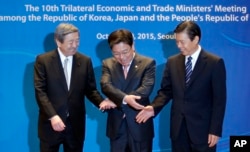South Korean President Park Geun-hye and Japanese Prime Minister Shinzo Abe held their first formal bilateral talks here Monday to try to resolve a bitter diplomatic standoff over the contentious "comfort women" issue that has divided Washington’s two key military allies in Asia.
Since she took office in 2013, Park had refused to meet with Abe until he offered a "sincere apology" and reparations to the thousands of Asian "comfort women" forced into sexual slavery by Japan’s military during its occupation of Asia and during World War II.
After their meeting, Abe said the two leaders promised to increase efforts to peacefully resolve this issue.
"It's the 50th anniversary of the normalization of ties this year. Keeping that in mind, we've agreed to accelerate talks for the earliest possible resolution," said Abe.
In August, Park opened the door to reconciliation after Abe promised to uphold apologies made by past Japanese leaders to comfort women and other victims of Japanese wartime atrocities.
But at the start of Monday’s bilateral meeting, she reiterated that resolving this issue in a manner acceptable to the remaining surviving comfort women is key to re-establishing a stable diplomatic relationship with Japan.
"I hope today's summit will heal the bitter history in a broad sense and be a sincere one and an important opportunity to develop the two countries' relationship," Park said.
Japan’s position is that compensation for "comfort women" was legally settled by the 1965 diplomatic treaty normalizing relations.
In his speech commemorating the 70th anniversary of the end of World War II, Abe noted that in Japan today over 80 percent of the population was born after the war and said they should not be held forever accountable for these past atrocities.
The two leaders did not hold a joint public news briefing following the talks. And at least publicly neither side expressed any willingness to compromise on this issue.
But Hosaka Yuji, a political science professor at Seoul’s Sejong University says the South Korean president won a small but important diplomatic concession from the Japanese leader.
"Prime Minister Abe slightly moved toward President Park’s demand on the necessity of resolving this issue by the end of this year," Hosaka said.
Trilateral meeting
On Sunday, Abe and Park met with Chinese Premier Li Keqiang for the first such trilateral leaders meeting in more than three years. Historical disagreements as well as conflicting claims to islands in the region had contributed to the suspension of these talks.
The three leaders agreed to work together to improve the regional economic and security environment, to re-establish regular high-level meetings, and to use these forums to peacefully resolve divisive issues.
Beijing, Tokyo and Seoul also promised to establish a trilateral free trade zone and advance an "East Asia Market," an all-Asian version of the U.S-led Trans Pacific Partnership that was recently agreed to by 12 Pacific Rim economies that includes Japan and the U.S. but not China nor South Korea.
The three Northeast Asian neighbors also reaffirmed their support for restarting "six-party" international talks to peacefully end North Korea’s nuclear program.
In 2009, Pyongyang walked out of talks with Washington, Seoul, Beijing, Tokyo and Moscow, and subsequently conducted three nuclear tests that have drawn international condemnation and increasing United Nations sanctions.
South China Sea
At the bilateral meeting Prime Minister Abe reportedly told President Park that the South China Sea situation is a common concern and suggested the two counties cooperate on issues pertaining to the freedom of navigation.
Washington recently sent a warship near disputed South China Sea islets and reefs claimed by Beijing to protect the freedom of navigation in the disputed area.
Beijing, which claims jurisdiction over the 12 nautical miles (20 kilometers) of territorial waters around the islands as well as most of the South China Sea, protested the incident as a provocation.
While Tokyo has voiced support for Washington’s efforts to protect these key international shipping lanes, Seoul has been reluctant to publicly criticize Beijing.
U.S. Defense Secretary Ash Carter met in Seoul Monday with his South Korean counterpart Han Min-koo. The two held a joint press conference and were asked about China’s assertive behavior in the South China Sea.
Both defense chiefs voiced support for freedom of navigation and the peaceful resolution of maritime disputes but Carter very pointedly called upon China to halt any further dredging or militarization in the South China Sea.
“This is something that the United States has called for a halt on by all parties in the South China Sea and of course over the last year the party that has done the most of that kind of dredging and military activity has been China,” Carter said.
The Northeast Asian leaders did not publicly address rising tensions in the South China Sea during their statements following Sunday’s trilateral but all endorsed increased dialogue and cooperation to resolve regional disputes.
Youmi Kim in Seoul contributed to this report.







